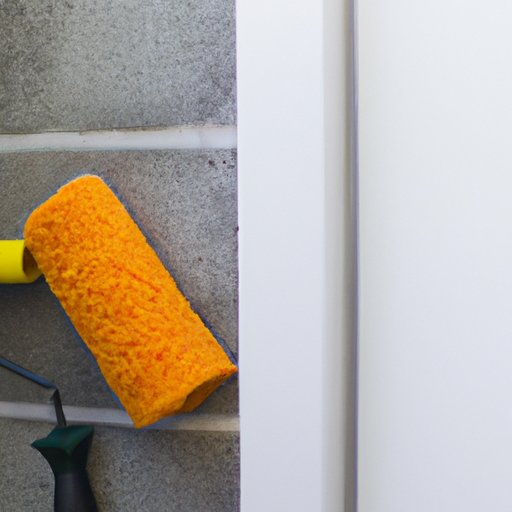
I. Introduction
Painting a room is an excellent way to freshen up a space and give it a new look, but it’s essential to prepare the walls properly before painting. An essential part of preparing for painting is cleaning the walls. If you paint over dirty or oily walls, the paint won’t adhere correctly, and the finish won’t be as smooth. In this article, we’ll show you how to clean walls before painting, including a step-by-step guide, tips, and tricks to avoid common mistakes.
II. Step-by-Step Guide
The following steps will help you clean your walls effectively before painting:
- Remove any wall hangings, pictures, or decorations, and wipe them clean.
- Protect floors and furniture by covering them with a drop cloth or plastic sheeting.
- Vacuum the walls to remove dust and cobwebs.
- Fill a bucket with warm water and add a small amount of dish soap.
- Wipe the walls with a soft cloth or sponge dipped in the soapy water.
- Rinse the walls with clean water to remove soap residue with a clean sponge or cloth.
- Allow the walls to dry completely before painting.
III. DIY Cleaning Solutions
While you can use a simple dish soap and water solution to clean walls before painting, there are many other effective cleaning solutions you can make at home using everyday household items. Here are a few recipes:
- Vinegar and water solution: Mix equal parts white vinegar and water in a bucket. Dip a sponge or cloth in the solution and wipe the walls.
- Baking soda and water solution: Mix 1/2 cup of baking soda and a gallon of warm water in a bucket. Dip a sponge or cloth in the solution and wipe the walls.
- Borax and water solution: Mix 1/2 cup of borax with a gallon of warm water in a bucket. Dip a sponge or cloth in the solution and wipe the walls.
IV. The Importance of Clean Walls
There are several benefits of cleaning walls before painting:
- Better paint adhesion: Clean walls provide a better surface for paint to adhere to, which is essential for a long-lasting finish.
- Reduced odors: Cleaning walls removes dirt and grime that can cause unpleasant odors in the home when painting.
- Smoother finish: When walls are clean, it prevents any bumps, lumps, or debris from being trapped under paint.
- Long-lasting paint job: Regular cleaning and maintaining walls ensure that the paint job is more durable, lasting for years without peeling or flaking.
V. How to Clean Specific Types of Walls
Different types of walls require different cleaning methods to avoid damage. Here’s how to clean specific types of walls:
- Plaster walls: These are more delicate than drywall and need a gentle touch. Use a soft-bristle brush or cloth for cleaning. Avoid using abrasive pads or cleaning agents that can damage the surface.
- Drywall walls: Use a soft-bristle brush or cloth to wipe the walls. Avoid scrubbing too hard, which can damage the surface.
- Brick walls: Brick can be challenging to clean because it’s porous and easily stained. Use a cleaning solution specifically designed for brick walls. Scrub with a wire brush and let the solution soak for a while before rinsing thoroughly with water.
VI. Tools and Equipment
When cleaning walls before painting, you’ll need some tools and equipment to get the job done right:
- Bucket
- Dish soap or other cleaning solution
- Sponge or soft cloth
- Vacuum cleaner
- Drop cloth or plastic sheeting
- Gloves
- Eye protection
VII. Common Mistakes to Avoid
There are some common mistakes people make when cleaning walls before painting, which can affect the quality of the finished paint job. Here are some tips on how to avoid them:
- Using too much water when cleaning can damage drywall or plaster walls.
- Not rinsing the walls thoroughly can leave soap residue, causing problems with the paint job.
- Scrubbing too hard can damage the walls’ surface, leaving marks that will show through the paint.
- Using abrasive cleaners or pads that can damage the walls’ surface.
VIII. Conclusion
Properly cleaning walls before painting is an essential step to ensure a beautiful, long-lasting paint job. With a little planning, the right tools and cleaning solutions, and careful attention to details, you can quickly and easily clean your walls for painting. Take advantage of the benefits of a clean wall today and enjoy the results for years to come.
Remember to follow the tips and advice in this article to avoid common mistakes and achieve a successful paint job.
Clean walls will ensure your painting project will be a great success and leave your home looking clean and refreshed.




